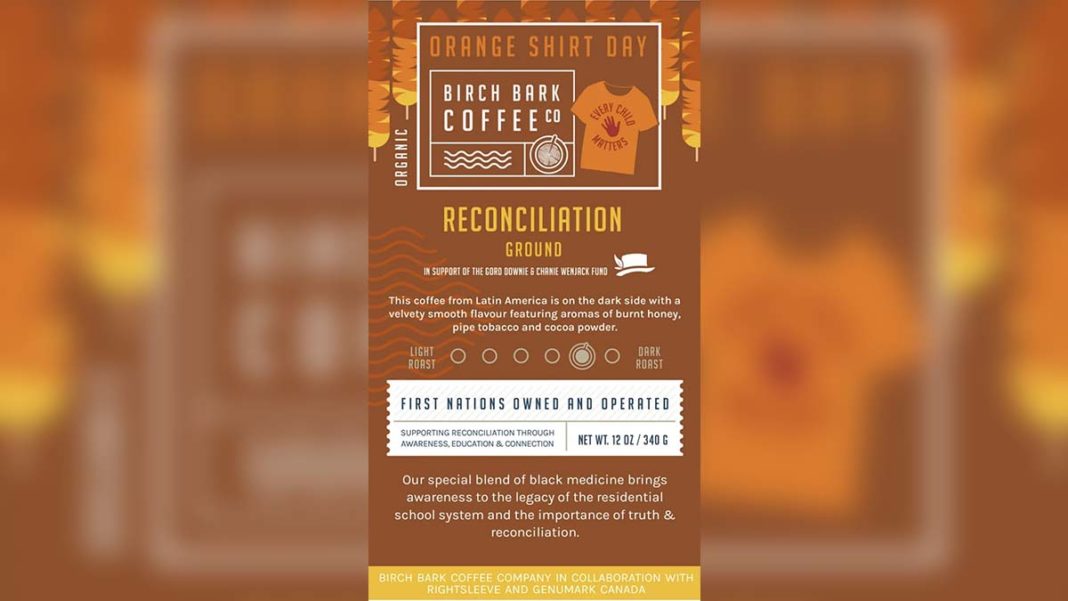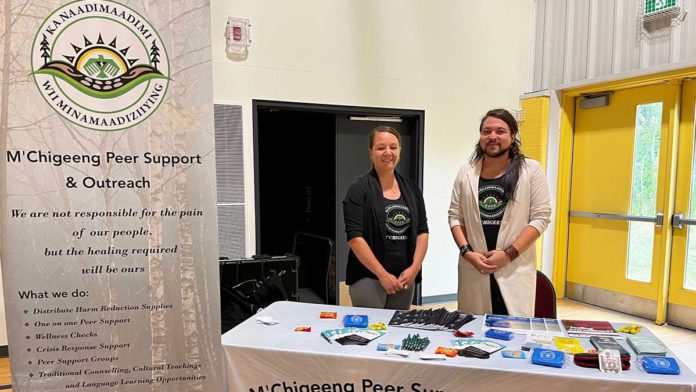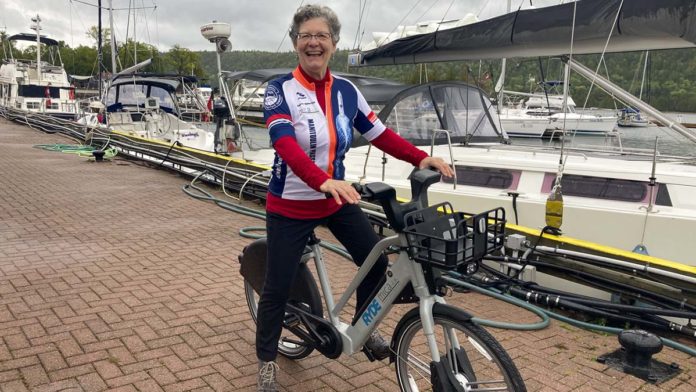Birch Island product’s profits support Truth, Reconciliation efforts
BIRCH ISLAND—Five years ago, Mark Marsolais-Nahwegahbow, a member of Whitefish River First Nation, founded Birch Bark Coffee Company. It’s a social enterprise, meaning giving back is built into its corporate values and operations. Last year, the company introduced a Reconciliation coffee blend. “I was getting so frustrated with the saturation of Orange Shirt Day,” said Mr. Marsolais-Nahwegahbow. “I wanted to bring back the reason as to why it was originally created.”
In collaboration with Genumark/Rightsleeve, Birch Bark Coffee Company has created the limited-edition Reconciliation blend in recognition of Orange Shirt Day on September 30. Set proceeds will go to the Gord Downie and Chanie Wenjack Fund to help bring education and awareness to the legacy of the Residential School System and the importance of Truth and Reconciliation.
Chanie Wenjack was an Anishinaabe boy from Ontario who ran away from his residential school near Kenora at age 12. His death from hunger and exposure in 1966 sparked national attention and led to the first inquest into the treatment of Indigenous children in Canadian residential schools.
The Gord Downie and Chanie Wenjack fund is part of Gord Downie’s legacy; he was committed to improving the lives of First Nation peoples in Canada. The goal of the fund is “to continue the conversation that began with Chanie Wenjack’s residential school story, and to aid our collective reconciliation journey through a combination of awareness, education, and action.”
“Reconciliation coffee is really a hot number right now,” said Mr. Marsolais-Nahwegahbow. “I’m really proud to work with the non-profit organization for the Wenjack-Downie family. We did it last year as a start. It was just an entrepreneurial thing.
Basically, one of his biggest goals was to bring back the true meaning to Orange Shirt Day, he said. “I can only speak for myself but I see it as being so saturated. Everybody’s selling t-shirts, making all these designs and they’re not really Indigenous and I wanted to bring back the true meaning.”
He collaborated with Genumark Canada and Rightsleeve and pitched it to them. They designed all the labels. Mr. Marsolais-Nahwegahbow then reached out to the Gord Downie/Chanie Wenjack family and said, ‘I really love what you guys do. You’re a non-profit and I’d like to help out with my social media platform and bring back the true meaning and the reason behind Orange Shirt Day, and let people know the importance behind it; that it’s not the focus on the materialistic things of t-shirts and things.’ They were very happy.”
Birch Bark Coffee Co.’s social media links back to their page so people can see what the fund does and learn the importance of the communities, of reconciliation and of residential schools. “It hits home with me,” he said. “My family went through residential school. My mom went through day school and so did my cousins. It is a really important piece for me.”
Last year, on their first attempt, they raised about $2,500 for the Downie/Wenjack fund. “It was all new to us to get this Reconciliation off the ground,” said Mr. Marsolais-Nahwegahbow. “There were a lot of logistics behind it. It was rushed. Anyway, we got it running and this year went even smoother. I think we’re going to do quite well. We’re going to raise a lot of money and we’re excited.”
He said many people have written asking him to keep the blend going year-round. “You have an opportunity until October 10 to purchase Reconciliation coffee by the case so we can give back,” he said.
This year will also be the second round for their Spirit coffee blend, which brings attention to the Highway of Tears and to Murdered and Missing Indigenous Women and Girls. Both of these blends are only available for a set period of time.
“There’s a big shift happening in the food industry, a consumer shift,” he said. People want to know more about where a product came from and what it’s about. There is a push for more local and more BIPOC opportunities, for social enterprises like Birch Bark Coffee Co. that are innovative and have a main focus on social impacts. “People seem to be shifting towards people like myself, not myself but the company,” he noted. “I think what it does is allows me to offer consumers a better way of being ethical and socially responsible.”
There are a number of partnerships and collaborations underway. Birch Bark Coffee is showing up in universities and colleges and will be in Costco stores soon. The labels on their coffee bags are put on by a non-profit organization in Nova Scotia called Flower Cart. This provides employment for people that can’t readily get in the workforce, people that have Down’s Syndrome or have to be supervised, He said. “They put all of the labels on our coffee bags by hand.”
There’s another big announcement coming soon. Birch Bark Coffee Company has given back to First Nation communities by providing individual water treatment systems, but a new project will see them partnering with an Ontario First Nation to develop a community-sized water system that will provide clean drinking water.
“As the company grows, I want to give back to everybody,” he said. “That was my main goal. I just want to give back as much as I can in this world and make it a better place.”





